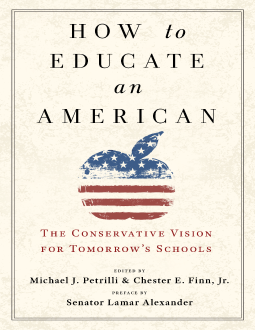In the years after A Nation at Risk, conservative ideas for reforming America’s lagging education system gained much traction. Key items like school choice, rigorous academic standards, and results-based school accountability drew bipartisan support and were put into practice across the country.
Today, sadly, bipartisanship is hard to find. Education reform has stalled. On the left we find “progressive” policies that do little to boost the skills and knowledge of young people, and on the right we often find over-confidence in what school choice alone can do to advance quality education. Now is the moment for thoughtful conservatives to re-engage their minds and their commitment to better opportunities and stronger achievement for all young Americans, wherever they attend school—and to put forth a fresh vision for what that entails and how it can be done.
In this important new book, essays by twenty leading conservative thinkers—with a compelling preface by Senator Lamar Alexander—do just that. They contend that every student should graduate from high school with a robust understanding of the country’s history, including gratitude for its sacrifices, respect for its achievements, and awareness of its shortcomings. They should be well prepared to become trustworthy stewards of a democratic republic, capable of exercising virtue and civic responsibility, and of contributing to political and civic discourse with an open mind. And their schools ought to prepare them well for productive, rewarding, and dignified careers, including respected, quality options for those seeking alternatives to traditional colleges.
Anchored in tradition yet looking towards tomorrow, How to Educate an American should be read by anyone concerned with teaching future generations to preserve the country’s heritage, embody its universal ethic, and pursue its founding ideals. It has drawn praise from leading policymakers and educators, including Senator Ben Sasse, Harvard’s Richard Elmore, AEI’s Rick Hess, and former governors Mitch Daniels and Jeb Bush, who writes: "How successful we are in educating the next generation of Americans will determine our nation’s future. This collection of essays from leading conservative minds is the conversation-starter we need."
How to Educate an American: The Conservative Vision for Tomorrow's Schools is published by Templeton Press and is available for purchase on its website or Amazon.
Adapted book excerpts and discussions about it can be found at the links below:
Michael J. Petrilli and Chester E. Finn, Jr. “School Choice Is Not Enough.” The Bulwark.
Eliot A. Cohen. “History, Critical and Patriotic.” Education Next.
Jay Mathews. “Colleges should be laboratories of respectful, diverse thinking. What happened?” Washington Post.
Nicholas Eberstadt. “Education and Men without Work.” National Affairs.
Ian Rowe. “Measure What Matters.” Project Forever Free.
Adam Kissel. “Teaching Civics to Young Americans As If It Mattered.” Philanthropy Roundtable.
Naomi Schaefer Riley. "In Defense of ‘Paternalism’: Why Choice Schools Need to Get Better at Grappling With the Family Lives of Their Toughest-Case Students." The 74.
Bill Bennett. "Chester E. Finn 'How to Educate an American: The Conservative Vision for Tomorrow’s Schools'." Bill Bennett Show.
Mark Tapson. "How to Educate an American: The Conservative Vision for Tomorrow’s Schools." Frontpage Mag.





